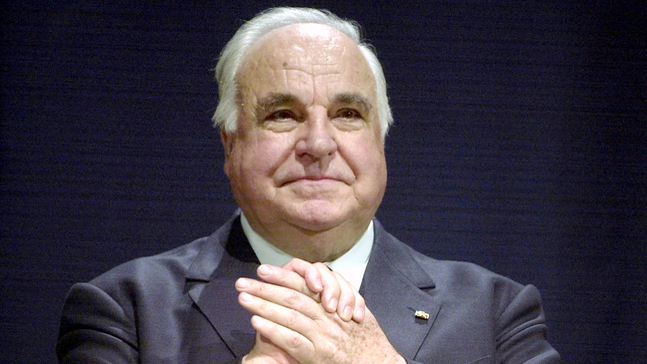“A great German and a great European”
World leaders are paying tribute to German ex-chancellor Helmut Kohl
The world is recalling these days the contribution of the former German Chancellor Helmut Kohl to the unification of the FRG and the GDR into a united Germany and the establishment of unity in Europe. In particular, Jean-Claude Juncker, President of the European Commission, told the German newspaper Bild: “Even before his passing, Helmut Kohl had been awarded an honorary citizenship for his extraordinary services. That is why we owe Kohl a European state ceremony, and I will personally see to it that it happens.”
The current German Chancellor Angela Merkel honored the memory of her former mentor who offered her the first ministerial post in 1991. She wrote in the book of condolences: “In Helmut Kohl, we have lost a great German and a great European. He made an almost unparalleled contribution to the restoration of our country’s unity and to European harmony.” Merkel described her mentor as a “stroke of luck” for Germany.
Former US president George Herbert Walker Bush, who cooperated with Kohl and Soviet leader Mikhail Gorbachev to reunite East Germany and West Germany, described Kohl as “a true friend of freedom,” saying he considered him “one of the greatest leaders in post-war Europe.” “Working closely with my very good friend will remain one of the greatest joys of my life. Throughout our endeavors, Helmut was a rock – both steady and strong,” Bush said.
President Frank-Walter Steinmeier of Germany said Kohl was an “exceptional politician” with a “strong character.”
French President Emmanuel Macron posted a German-language tweet praising Kohl as “pioneer of a united Germany and German-French friendship.” He also posted a photo of Kohl standing side-by-side with the late French president Francois Mitterrand as a sign of reconciliation between the two countries.
British Prime Minister Theresa May call-ed the ex-chancellor “a giant of European history.”
US President Donald Trump hailed Kohl as a “friend and ally of the United States,” while former US president Bill Clinton said that Kohl’s “farsighted leadership prepared Germany and all of Europe for the 21st century.”
“My sincere condolences to the German people on the irretrievable loss of Helmut Kohl, an epochal person, the leader who made an invaluable contribution to strengthening European unity and healing the scars of the Cold War,” Ukrainian President Petro Poroshenko wrote in Facebook.
Helmut Kohl departed this life on Friday, June 16, aged 87. He held the office of German Chancellor for 16 years, having been reelected four times in a row. In the 1982 elections, he defeated all his rivals and became the youngest chancellor in the Federal Republic’s history at the age of 52, the BBC points out.
Kohl endorsed the idea of a united Europe, and it is largely thanks to him that the Maastricht Agreement, which laid the groundwork for the European Union, was signed. Besides, Kohl was a co-author of the project of the euro, the single European currency.
The Day requested an expert to comment on Helmut Kohl’s role for and importance to the world, Europe, and, particularly, Ukraine.
“IT IS THE CALIBER OF THE POLITICIANS WHO WERE CHANGING THE HISTORY OF NOT ONLY THEIR COUNTRIES, BUT ALSO OF EUROPE”
Volodymyr OHRYZKO, Minister of Foreign Affairs of Ukraine in 2007-09:
“I used to meet Helmut Kohl as part of delegations and take part in negotiations. I must say he was an interesting person to speak to.
“As for his importance to Europe, he was an uncommon and prominent political figure who managed to do the impossible, for it is thanks to his efforts that Germany finally reunited. This did not happen overnight, so to speak. It took many years to map out and pursue this strategy very well.
“And it is Kohl’s wise policy that helped Germans achieve the dream of reuniting in one country again.
“He was a great European and, at the same time, saw a united Germany as part of the European process. This is what clearly distinguished him among other political figures. He understood the strategic importance of partnership with France. He understood that it was the backbone of European integration and did his best for the two countries to replace the dark pages of their history by the prospects of European unity.
“As for Eastern Europe, he undoubtedly considered Russia a top priority. This was inherited from the Soviet era, when he managed to persuade Gorbachev to agree to German reunification. This is why he continued by inertia to focus, above all, on Russia in the post-Soviet space, paying far less attention to other countries, including, incidentally, Ukraine. In spite of his ostensibly positive attitude to what was going on in Ukraine, he saw the development of relations with our country (at least while he was the chancellor), one way or another, through the prism of relations with Moscow. We are perhaps also to blame because we did not show the kind of progress made by Poland, the Czech Republic, or the Baltic countries, where Germany invested very actively in reforms. We didn’t have any, so it was easy to understand the pragmatic German who thought it advisable to do something if this produced practical results.
“I can’t see leaders of Helmut Kohl’s scale here so far. I would compare him with Charles de Gaulle or Margaret Thatcher. It is the caliber of the politicians who were changing the history of not only their countries, but also of Europe as a whole, who had an impact on the global development.
“I wish we would live to see a Washington of our own, but I strongly doubt that it is on the agenda.”
Newspaper output №:
№40, (2017)Section
Day After Day





